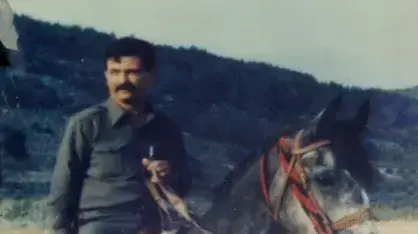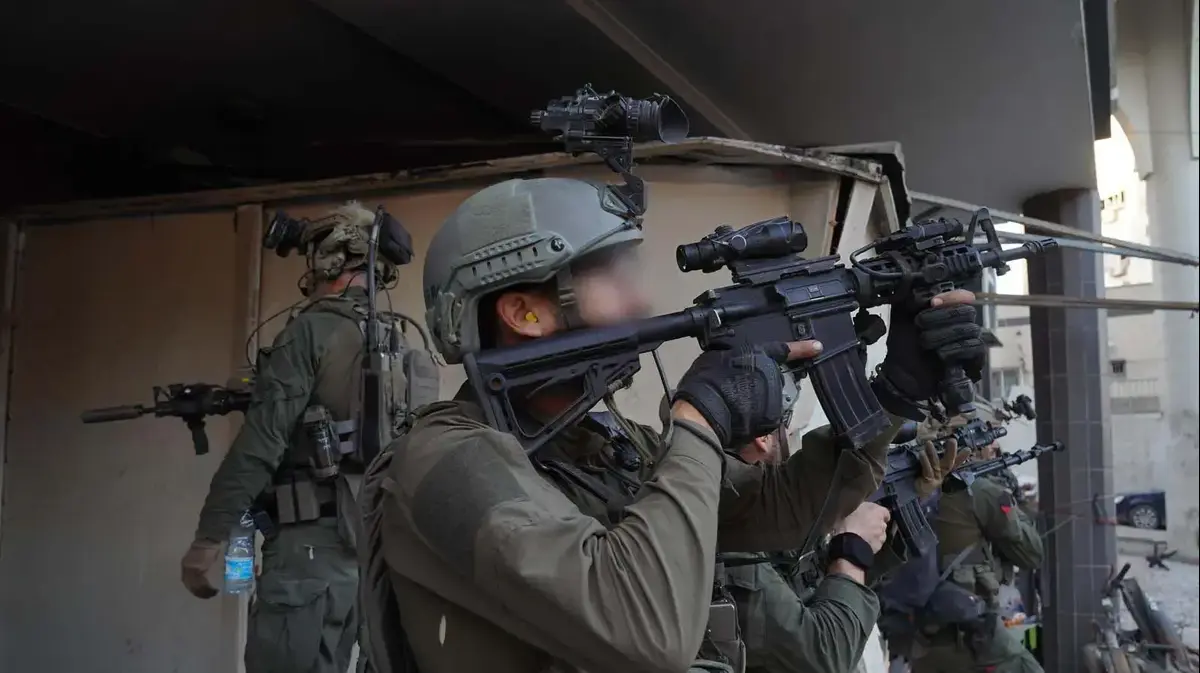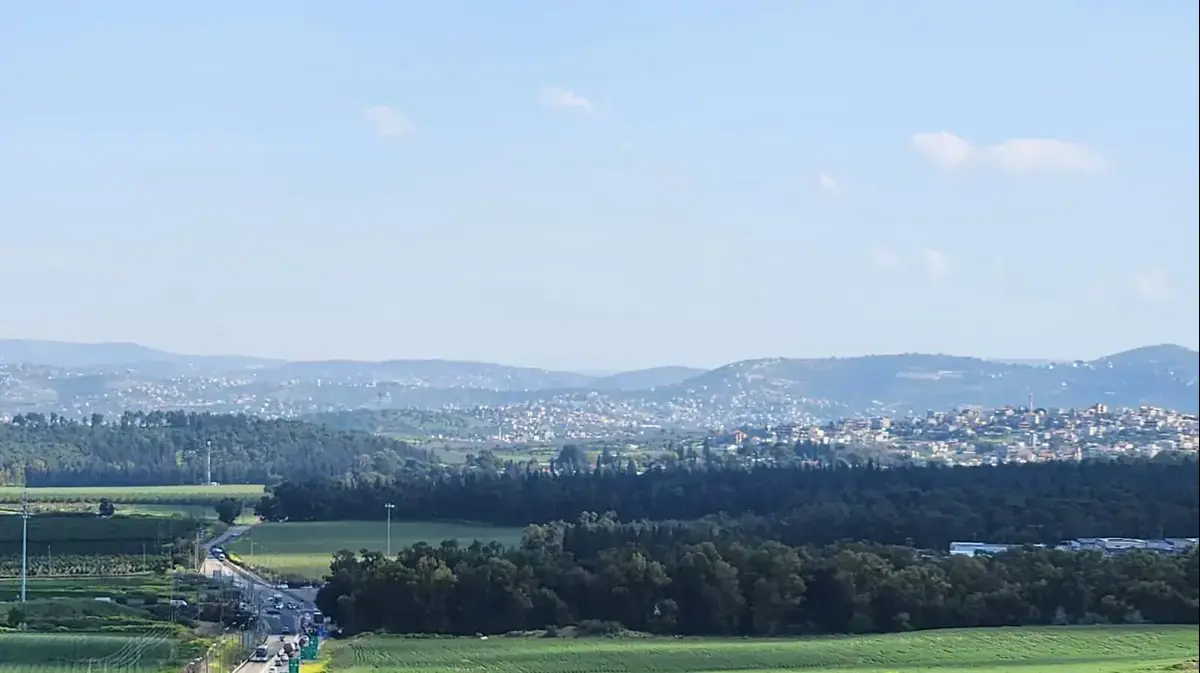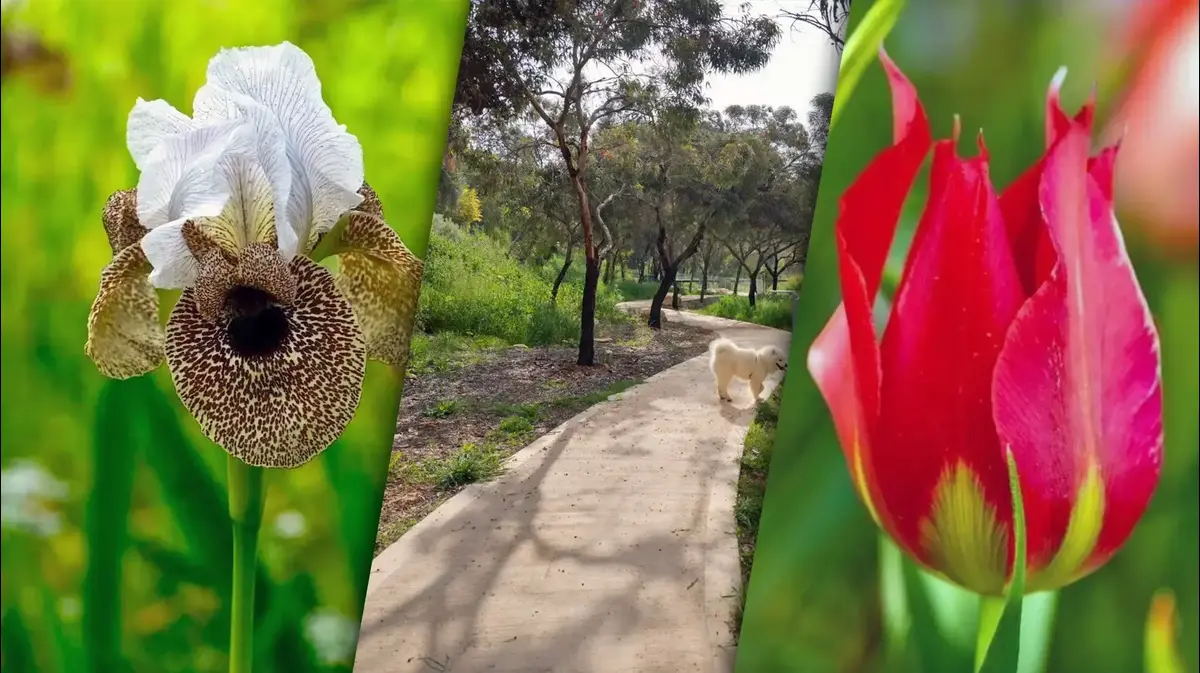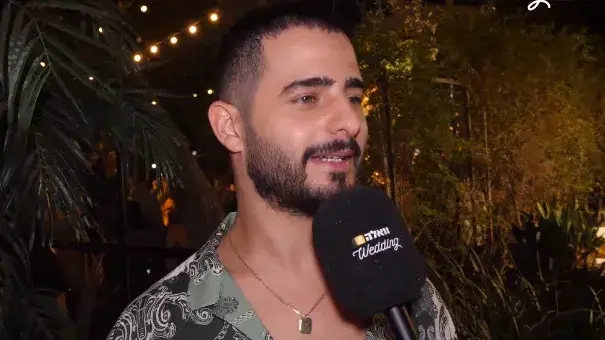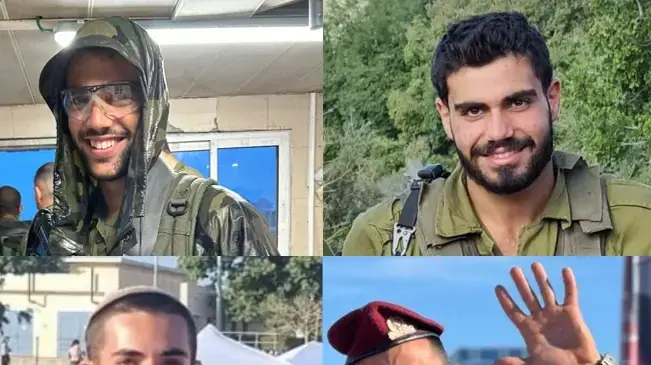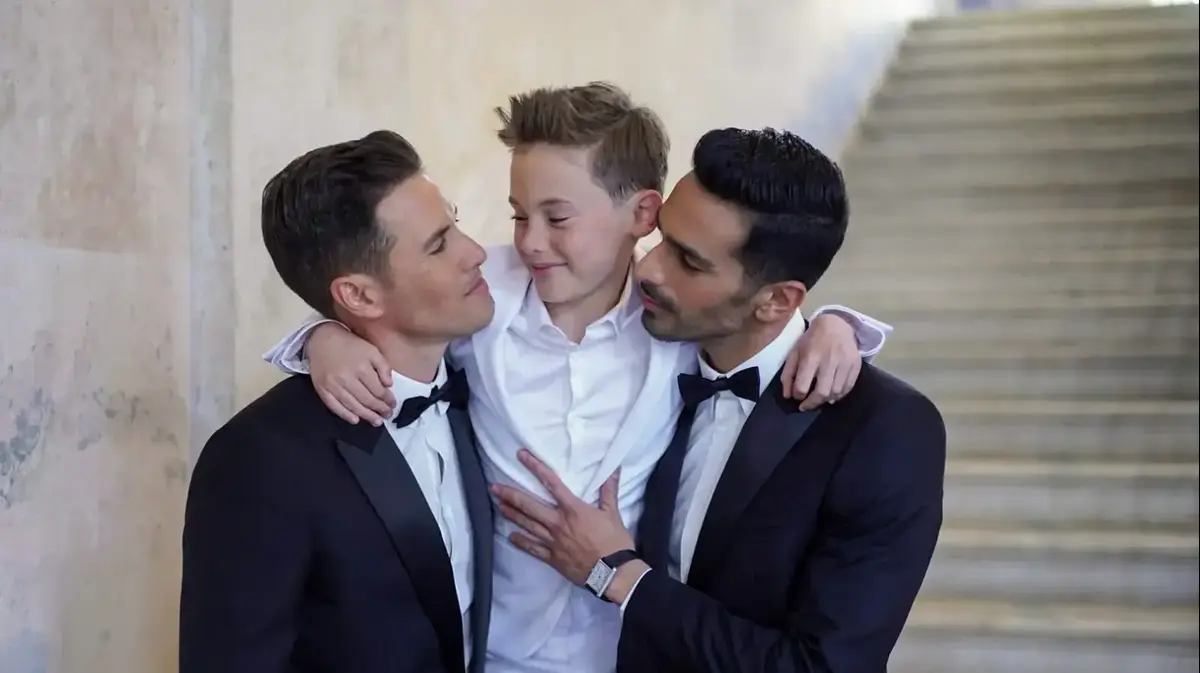Mustafa Tabash, passed away at the age of 85 (photo: courtesy of the family)
At the entrance to the village of Tabash stands the house of Mustafa Tabash.
Yasser, his eldest son, says that there is not a day when guests did not visit his father's house.
"His door was always open. Human encounters and human love were the most important things to him. He never missed an opportunity to help and said that when he helps, it makes him feel good."
A week ago, Mustafa Tabash passed away at the age of 85.
Thousands from the Galilee to the Negev came to his funeral and comforted the family of the man who was for more than 50 years the well-known keeper of the fields in the northwest of the Jezreel Valley, the Mukhtar of the village, and a man who forged courageous ties with the localities of the region.
"My life is for the benefit of the people. You can treat everyone nicely. I wanted others to know how to behave - honestly, justly, according to the truth," he told his neighbor Irit Gurion, who wrote the story of his life and published it in a book she published.
Mustafa Tabash was born in 1937 to his parents Saleh and Rafea, the second of ten brothers and a sister.
All his life he lived in the same place where his grandfather and father were also born - between Nahal Tzipori and the neighboring settlements - Bethlehem HaGalilit and Aloni Abba.
The small village had no vehicular access, no electricity and no running water.
Until the age of seven, Mustafa studied the Koran and arithmetic with a cleric that the village families brought from Shfaram.
He studied together with 20 other children of different ages who were divided into study groups, according to the ages.
When the teacher left and returned to Shafaram his father asked him to take Mustafa to study at the school in Shafaram, together with his son and he moved to study there.
Mustafa with Irit Gurion, who wrote the book "Mustafa Tabash - The Mokhtar" (photo: official website, courtesy of Irit Gurion)
In Gurion's book, "Mustafa Tabash - The Mokhtar", he says that he would come to school on Mondays riding an Aton and release her so that she could return to her town, which remained in the village, and on Thursdays his father would come riding a horse and pick him up home.
Tabash also said that he was the only Bedouin in the school and suffered from the children's bullying, but despite this he was the best student in his class.
In 1948, during the War of Independence, studies were stopped.
He remembered that they said that the school would be used as a residence for soldiers coming from Lebanon.
Mustafa remembered many dead who were brought to Shafaram from the area of the battles near Usha and Ramat Yochanan.
Tabash himself almost lost his life in an unusual event.
When he was 11 years old, he was sent to fetch a sack of wheat while riding on an Aton, when suddenly Israeli soldiers started shooting at him, and he was miraculously saved when he hid behind a large rock.
At some point the family decided to flee to Lebanon and went north.
When they arrived in the area of Kfar Ka'Okb, they received a message from an Israeli police officer from the Nahalel police station, that they could safely return to their home, and so they did.
When Faram was occupied by the IDF without resistance, a military governor was appointed and studies resumed. He said that everything changed, when the Germans who lived in Eloni Abba left and were replaced by Jews. Until then, he had never met a Jew, and many told him that they were scary and did bad things. His relationship with Jews began when he was walking in the forest with a friend, and saw a Jewish shepherd. He and the shepherd communicated in sign language, and the two understood that he was interested in buying eggs. Therefore, Tabash began to come to Aloni Abba and sell eggs.
At the age of 15, the residents of Aloni Abba approached him with an offer to guard the Nave Yaer experimental farm for two hours every day in the afternoon, so that children from the settlement would not steal vegetables.
Moshav was impressed by his success and offered him a job as a keeper of their pastures and orchards.
Then the people of Bethlehem the Galilean also asked that he keep their territories.
Since then, for 53 years, until 1995, he worked as a field guard.
At the age of 17 he married Miriam.
Neighbors from Aloni Abba helped transport water in a tank, pulled horses and also lent a tractor to light up the dance floor.
He said that it was the first wedding that the neighbors from Aloni Abba and Bethlehem of Galilee came to and was very happy, but said that they could not hear the singers because of the noise of the tractor engine.
The couple had 12 sons and daughters.
More in Walla!
Lung cancer: the treatment of cancer patients in early stages
In collaboration with the Israeli lung cancer association
Mustafa Tabash and Giura Zeid (photo: courtesy of the family)
In his work as a guard in the fields of the area and as a young man Tabash wanted to start a family and establish a quiet and safe life.
Therefore, he realized that he had to remove a heavy cloud that was hanging over his family.
Bedouin friends repeatedly told him that Giora Zeid was asking about the family and was interested in it.
Giora's father was Alexander Zeid, a member of the "Hashomer" organization and the guard of the fields in the Jezreel valley, who was murdered in 1938 by gunfire, when he was returning from Aloni to his home in Sheikh Avrik in the evening.
The murderer was Kasem Tabash, the cousin of Mustafa's father.
Five years later, the Palmach men shot Qassem Tabash to death. It was said that according to intelligence that had accumulated, he was suspected of murdering 11 more Jews.
Giura, his father, was a field man, spoke Arabic on his own and served as a monitor in the security service of the Haganah, which was entrusted with gathering intelligence. After the establishment of the state, he was one of the founders of the Shin Bet and a senior member of the military government and worked to strengthen the state's relationship with the Druze and Bedouins.
Mustafa feared that in view of the sediments of the past, his family was assigned.
He decided to contact Giora Zaid and went with his mother to Zaid's house.
Tabash said that he was amazed, Zaid was amazed at the first meeting;
He initially thought that Zaid was a Bedouin, because of the Arabic dialect in which he addressed them.
Zaid reassured him and said that he had no conflict with his family, and then he came to the Tabash family's house to offer his hand in peace.
"We saw a jeep approaching us. It was a strange sight. There was no way for cars anymore. Father realized it was Gyura Zeid. He approached us and called 'Salaam Alikum' like us. He and father hugged and kissed like old friends. I relaxed. They entered the tent, Father called the whole family and they made salah. They slaughtered a lamb and there was great joy," Mustafa told Irit Gurion.
From that day on, a special bond was forged between Mustafa Tabash and Giura Zaid, even though Zaid was 23 years older than Tabash.
"They were considered extraordinary figures in the societies they came from, one among the Arabs and one among the Jews," said Avishi, Giora's son.
According to him, "Everyone came to this meeting with their own family baggage. Father realized that the pain is mutual and not one-sided. The insight came to him that there is also another side with problems and pain."
On Mustafa he said that he brought to this relationship his "special personality. A warm personality with a lot of wisdom. He never saw the narrow angle of his family and wanted the best of the entire area. An impressive man, beautiful, and well-spoken. He radiated on the whole environment" .
Mustafa said that Magiora Zaid learned the job of guarding and Zaid even gave him the hunting rifle of his father, Alexander, so that his son Talal could use it in learning the job of guarding the fields.
Mustafa Tabash eulogizes Giora Zeid (photo: courtesy of the family)
The friendship between the two also connected the families.
The sons Yasser and Avishi remember an episode that characterizes the same relationship.
When they were seven years old, each of them lived for about a week in the other family's house.
Avishi remembers going with his father to Beit Tabash and at the end of the visit he was told that he would stay at his friend's house for a few days and from Mustafa he asked that his son not be treated differently or preferentially.
"I felt like a member of the house," said Avishi, 60 years later.
Then it was the turn of Yasser, Mustafa's eldest son, to stay for several days at the Zeid family home.
According to the folklore stories of the two families, when Asar returned to his home, Mustafa "scolded" Giura for spoiling his son.
Suddenly he realized that there was electricity, running water and roads.
"Now you have to make sure we have it too," said Mustafa to Giora, a neighborhood in the "Abu Zeid" area.
When Giora Zeid passed away in 2005, his friend Mustafa eulogized him over his grave.
The son Yasser said that his father "believed in integration into Israeli society. As part of his work as a guard, he created relationships of trust with all the residents of the area and with the government offices, and he used these relationships to help anyone who turned to him for help."
Mustafa explained: "I'm doing all this for justice and also to get the Bedouins used to a different way. The country is also mine, I'm from the place and I want justice to rule here."
In 1964 Tabash was appointed Mukhtar of the village, a position he held at the same time as a guard until the 1980s.
The way he pursued his work even brought him into tension with his father in one case;
A herd of goats grazed by his brother invaded the pasture of Aloni Abba.
Mustafa imprisoned the herd and demanded that his father pay for the damage, so that he would release the goats from the pen.
His father was angry with him and he left the shack his family bought him and moved with his wife to Aloni Aba for several months.
When they returned to the village, they bought a plot of land and from Moshav Nahalel they purchased the hut that served as the Moshav's secretariat and made it their home. In another case he imposed a fine on himself.
It was when his aunt grazed his donkey and her donkey and entered the moshav field with them.
He fined her and him two pounds.
Over the years he began to gain a special status and respect in the whole environment.
"I'm doing all this for justice and also to get the Bedouins used to a different way. The country is also mine, I'm from the place and I want justice to rule here," he explained
"His very presence radiated a sense of power" (photo: courtesy of the family)
Nearly thirty years ago, he acceded to the requests of two Jewish families and sold them a piece of land so that they could build their homes in Tabash.
One of the families is the family of Irit Gurion who collected his stories for a book.
His son Yasser said that "he believed that such acts would bring the peoples closer together and help them live together. It pained him to see that the conflict between the peoples continues and he wished that people would be able to see life here in a different way and change their way of thinking. All his life he hosted people in his home and preached a life together. for brotherhood and peace".
Yasser continued his father's path as a public servant - he was an officer of the Northern District in the Ministry of the Interior, head of an authority appointed in several councils in the North and South and was elected as the head of the local council of Kabia-Tabash-Khajajara.
After he retired from his job as a security guard, Tabash founded together with Ilan Peleg, a Moshavnik from Shemod Deborah, a tourism project called "Secrets in the Valley".
Visitors would go on a horseback riding trip, sleep in tents, hear Mustafa's stories and experience herding a herd of goats.
After his wife passed away, he remarried, to Abella.
Ten years ago he suffered from cerebral palsy followed by disability, but his mind remained clear and lucid.
"His very presence radiated a sense of power and served confidence and a good feeling," Yasser said.
"Now we, his family, and the whole region will miss him."
news
News in Israel
Events in Israel
Tags
Bedouins
Jezreel Valley

